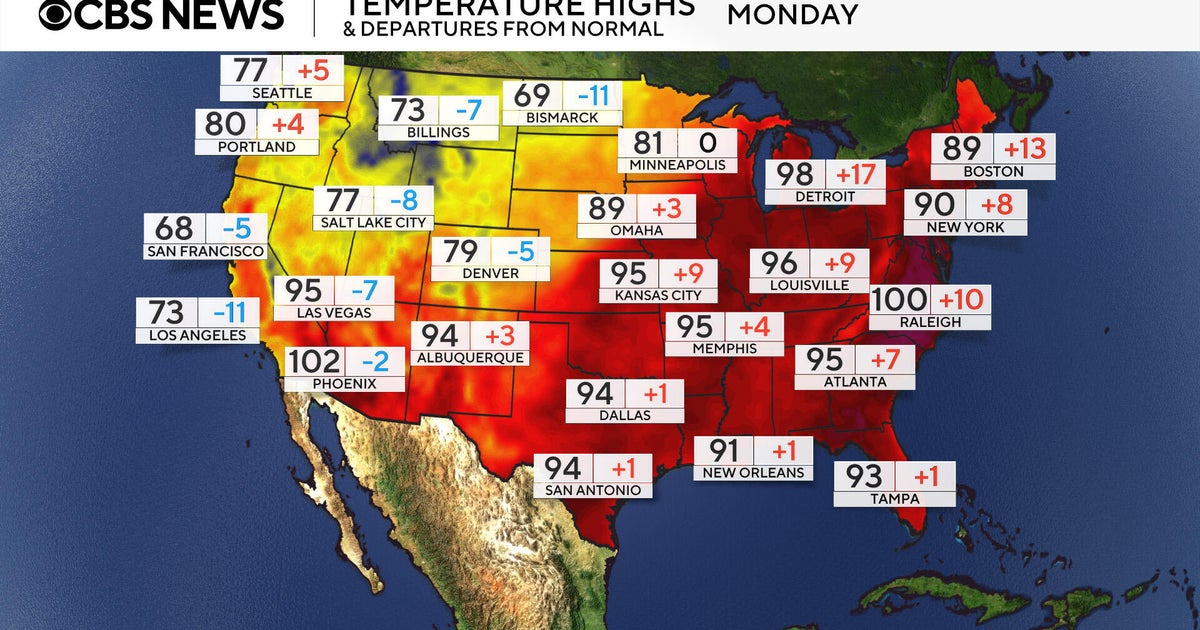

No response returned

A brutal heat wave is settling in across the eastern United States, and it's forecast to bring several days of record-high temperatures this week. The has called it "the first significant heat wave this season."
The NWS said people from the Midwest to the East Coast should expect "numerous daily record maximum and minimum temperatures" through at least Wednesday.
"Light winds, sunny skies, and a lack of overnight cooling will pose a significant risk to those without adequate cooling and/or hydration," the weather service warned.
More than 150 million Americans are under the highest-level extreme heat alerts. Including heat advisories, the total number affected rises to 200 million. This marks one of the most expansive heat alert events ever, with major population centers from the Midwest to the Northeast under serious heat strain.
Here's what to know about the heat wave and how to stay safe.
"Summer has taken its time arriving in the Northeast, but it's coming in HOT," the National Weather Service wrote in a social media post last week, warning of triple-digit heat index readings "with oppressive humidity." The is what the actual temperature feels like when it's combined with relative humidity.
Heat indexes on Sunday hit 103 F in Chicago, 105 in Pittsburgh and around 104 in Columbus, Ohio. Forecasts in Philadelphia called for a heat index of 108 on Monday.
Meteorologists say it's due to — an area of high pressure in the upper atmosphere that — sitting over a large portion of the country. When a heat dome becomes stationary, the air within it can become extremely hot and stagnant, leading to dangerously high temperatures and poor air quality.
These maps show daily forecast highs across the country and their departures from average temperatures.
The heat shifted into the Midwest and Ohio Valley and then arrived in the Northeast and mid-Atlantic on Sunday, where it will linger through the first half of next week.
Parts of the Northeast face a "High Risk" of extreme heat through the middle of next week, according to the National Weather Service. Temperatures are forecast to be well into the 90s or even .
"I cannot emphasize this enough: extreme heat can be deadly," Gov. Kathy Hochul warned. "The best way to stay safe is stay indoors, with air conditioning. This is not the time to start training for the marathon."
A heat wave is a period of unusually hot weather that lasts more than two days, according to the National Weather Service.
It often, but not always, covers a wide area and can expose a large number of people to hazardous heat, which can be extremely dangerous for vulnerable people, including children and the elderly.
Warmer overnight low temperatures can make a heat wave especially dangerous, since they mean the body doesn't get as much of a chance to cool down.
"Your body needs a reprieve," Ashley Ward, director of the Heat Policy Innovation Hub at Duke University, told The Associated Press. "You don't get that overnight, we start the next day at a deficit."
When overnight temperatures stay above about 75 degrees Fahrenheit, she said, "You start to see some pretty extraordinary outcomes with respect to heat illness and heat stroke, and even mortality."
The simplest way to way to is to stay out of the sun and avoid extended time outdoors in extreme temperatures, experts say.
If strenuous outdoor activities are unavoidable, you should dress for the heat and wear lightweight, loose-fitting and light-colored clothing, . You should also by drinking plenty of water, even if you're not thirsty.
It's also important to be aware of any symptoms of overheating, which include muscle cramps, unusually heavy sweating, shortness of breath, dizziness, headaches, weakness or nausea, according to the . If you experience these symptoms, one major sign to seek care is if the symptoms don't improve after getting into a cooler environment or hydrating, .





